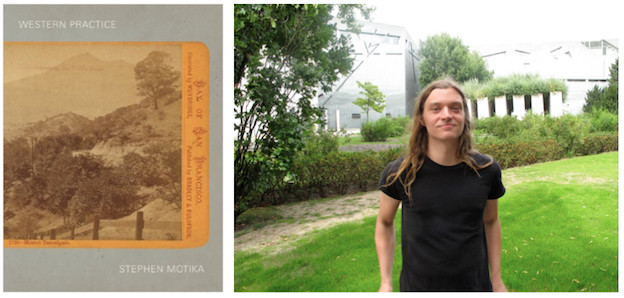Dear Stephen Motika

Western Practice
Western Practice
March 17, 2013
Dear Stephen,
I read Western Practice last night after watching Wong Kar Wai’s first film, As Tears Go By. It wasn’t a great film, but it contains flashes of brilliance that hint at things to come. This has been my habit lately. Give the baby a bath, put her to bed, eat dinner and watch a movie with Lori, read poetry while listening to music, climb into bed, read from a novel, go to sleep. I don’t remember what I was listening to when I read your book. It was either BBC Three or Blue Mars Cryosleep ambient radio.
I couldn’t help but marvel at your sense of space. The poems are so wide open. The words drift across the page like so many SoCal housing developments. I thought about Olson, “I take SPACE to be the central fact to man born in America.” I admire this kind of writing for the simple reason that I find it impossible to do myself. I have tried to write in an open field, to right-justify, to stagger my lines and stanzas, but I always end up back on the left margin.
I lived in California as a kid. My parents owned a house in a sleepy little suburb called Los Gatos, which I am told is now the heart of Silicon Valley wealth. It was just a suburb in the early seventies. My parents often used to joke that they could have retired on the proceeds if they had only stayed an extra ten years.
We moved back east when I was seven-and-a-half. That was 1976, the bicentennial. I never understood why they made that move, only five years after we had moved to California from Michigan. I asked my mom not too long ago. She said that they were Easterners and that they weren’t comfortable with the loose California lifestyle of the early seventies.
They voted for Reagan.
I can remember being in a car with my mom listening to the radio in 1976. She told me that we were voting for Gerald Ford and that we did not like Jimmy Carter. After Carter won, I can remember my father saying that Reagan was going to be the next president. There was something almost religious about the way he said it, like this was the second coming.
Anyhow, all of this added to the feeling of disorientation I felt while reading Western Practice. All that open space terrifies me, as if all the fears my parents had sown had started suddenly poking through the soil. My eyes drifted around the page, looking for a place where things didn’t feel so, uh, western. I found it when I got to the poem about Harry Partch.
What a great poem. I first heard of Partch when I was in college. My friend J. had graduated early to start graduate school and was living in a studio apartment on Jones Street in the West Village. I looked the address up recently on Google Maps. The whole building is a bed and breakfast now.
J. was the one among our group most tuned in to things avant-garde. While we were reading Chaucer, Shakespeare, and Milton, he was reading Foucault, Derrida, and Kristeva. One time we listened to the entire performance of Diamanda Galas’s “Plague Mass” while sitting on the floor of his apartment. It gave me nightmares.
When we listened to Harry Partch, J. talked about microtones and all the different instruments Partch had invented and how he had discovered a realm of sound that Western Civilization had suppressed for centuries. A few years later, I went to see a performance of Partch’s instruments and compositions at St. Ann’s church in Brooklyn.
They played the Ptolemy and the Chromolodeon and the Quadrangularus Reversum. They played the Boo and the Eucal Blossom, the Koto and the Crychord. They played the Gourd Tree with Cone Gongs, the Zymo-xyl, and the Spoils of War. A man with the deepest bass voice I have ever heard sang from Partch’s hobo opera while rising up and down on an instrument resembling a bellows.
My favorite was the Cloud Chamber Bowls — pyrex carboys from the UC radiation laboratory, once used for cloud chamber experiments, that hang on cords from a heavy wooden frame and are played with mallets. There was something beautiful and apocalyptic about those bowls. They made me think of actual clouds and the echo of church bells, but also of mushroom clouds and the thunder of death.
Anyhow, I have to run. I have only a little time to write each morning before I go to work. It was great eating lunch with you and Jonathan Skinner in the Sheraton at AWP a few weeks back. I enjoyed talking about your job and my job and Jonathan’s job. My salad was pretty good, but I have to admit I was lusting after the French fries the two of you got with your Reubens.
At one point I looked over your shoulder and saw Derek Walcott and Yusef Komunyakaa sit down next to each other at a long table on the other side of the lounge and wondered what they were talking about. Probably their jobs.
I really wanted one of those French fries. I guess I should have just asked for one.
Edited byLaura Goldstein Michelle Taransky